
Eupithecia is a large genus of moths of the family Geometridae. There are hundreds of described species, found in all parts of the world, and new species are discovered on a regular basis.

The lime-speck pug is a moth of the family Geometridae. It is a common species throughout the Palearctic region, the Near East and North Africa.

The common pug(Eupithecia vulgata) is a moth of the family Geometridae. It is a common species across the Palearctic region, the Near East and North Africa. It ranges from the Atlantic coast of Ireland and Portugal across Europe, the Middle East and Central Asia to the Russian Far East (Priamurje) and Korea.

The juniper pug or juniper looper(Eupithecia pusillata) is a moth of the family Geometridae. It is found throughout the Palearctic and Nearctic regions and the Near East.
In Greek mythology, Euryanassa is a name that may refer to:
In Greek mythology, Broteas, a hunter, was the son of Tantalus, whose other offspring were Niobe and Pelops.
In Greek mythology Tantalus, not to be confused with his more famous grandfather and namesake (Tantalus) who was also called Atys, was the son of Broteas. He ruled over the city of Lydia. He was the first husband of Clytemnestra and was slain by Agamemnon, King of Mycenae, a soldier in the Trojan War, who made Clytemnestra his wife. After he died, the Tantalid dynasty finished because Agron took the throne. He was a great-grandson of Heracles and Omphale, Atys's stepmother.
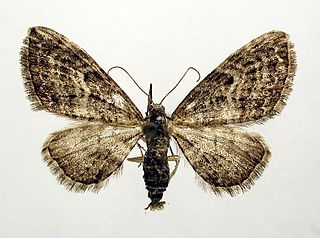
The larch pug is a moth of the family Geometridae. The species can be found in Europe, the Ural Mountains, West and Central Siberia, the Altai Mountains, Transbaikalia, Yakutia, the Far East, Mongolia, Korea, Japan and in North America, from Yukon and Newfoundland to New York and Arizona.

Eupithecia simpliciata, the plain pug, is a moth of the family Geometridae. It is found in the Palearctic ecozone, from western Europe to north-western China (Xinjiang).

Eupithecia venosata, the netted pug, is a moth of the family Geometridae. It was first described by Johan Christian Fabricius in 1787. It is found across the Palearctic ecozone from Portugal and Morocco in the west to the Lake Baikal in Siberia and Afghanistan and Pakistan in the east.
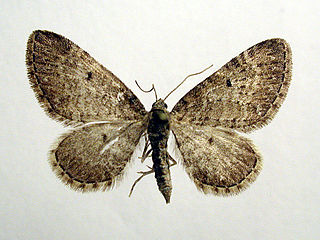
Eupithecia satyrata, the satyr pug, is a species of moth of the family Geometridae. It was described by Hübner in 1813. It is found from Ireland, through northern and central Europe East to all of Russia and Central Asia and West Siberia to Tibet. It is also present in North Africa and North America.
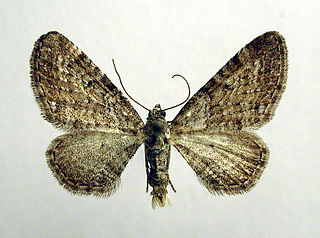
Eupithecia pernotata, or Guenée's pug, is a moth of the family Geometridae. The species was first described by Achille Guenée in 1857. It is known from the Alps, through Romania to southern Russia. It is also found in Finland.

Eupithecia quadripunctata is a moth in the family Geometridae. It is found in India, Pakistan, Nepal, Russia, China, Taiwan, Korea, Japan and northern Thailand.
Eupithecia variostrigata is a moth in the family Geometridae. It is widespread in the western Palaearctic, ranging from Spain to the western Pamirs in the east.

Eupithecia silenicolata is a moth in the family Geometridae. It is found from southern Europe and Morocco to western Asia, Iran and Pakistan. In the north, the range extends to southern Switzerland, Austria and northern Italy.
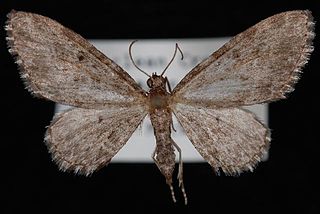
Eupithecia lachrymosa is a moth in the family Geometridae first described by George Duryea Hulst in 1900. It is found in North America from central Saskatchewan west to southern Vancouver Island, north to British Columbia and Alberta and south to California.
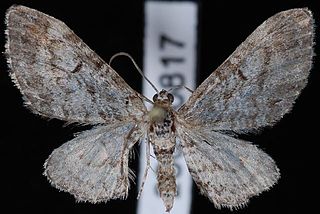
Eupithecia graefi, or Graef's pug, is a moth in the family Geometridae. The species was first described by George Duryea Hulst in 1896. It is found in North America from south-western Alberta west to Vancouver Island, north to Alaska and south to California. The habitat consists of wooded areas.

Eupithecia subbrunneata is a moth in the family Geometridae. It is found in China and Russia.
Eupithecia duena is a moth in the family Geometridae. It is found in Ecuador and Peru.















